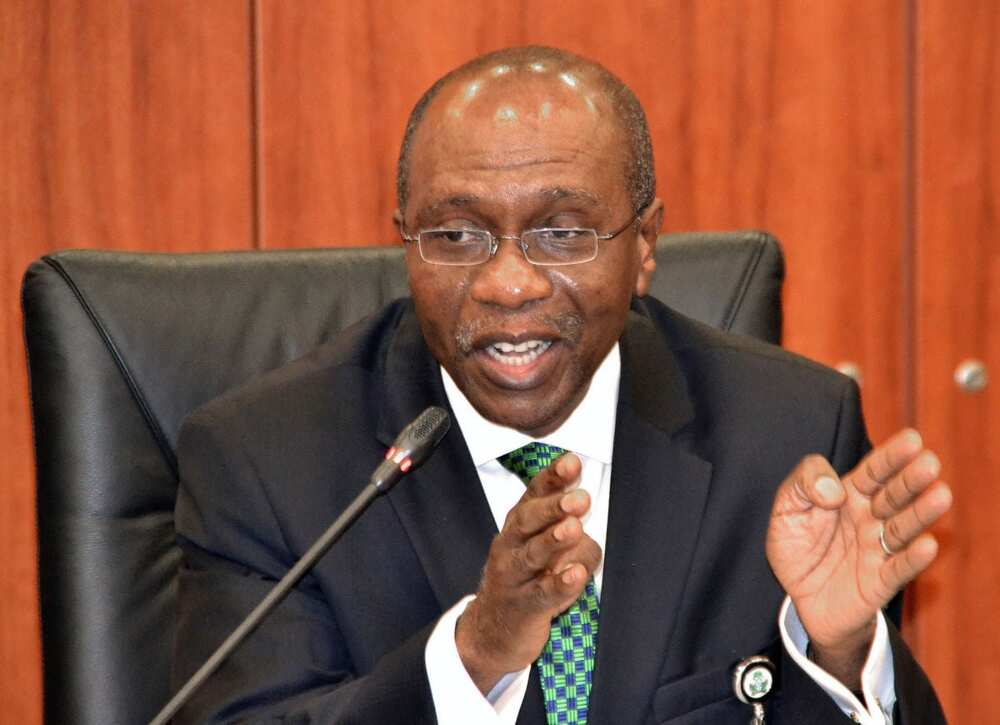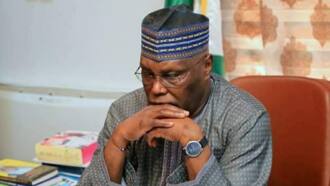Godwin Emefiele: Tick the Box (the Economy) by Monsuru Arilesere
Editor's note: A public affairs commentator based in Ibadan, Oyo state, Monsuru Arilesere, in this piece, stated that the Central Bank of Nigeria (CBN) governor, Godwin Emefiele has contributed immensely to the successes recorded in the Nigerian economy in recent times.
In the context of the current economic situation Nigeria finds itself, it is easy to dismiss and, perhaps, harshly criticise the role the Central Bank of Nigeria (CBN), has played in how the Nigerian economy has turned out, especially under its present governor, Godwin Emefiele.

Source: Twitter
What has been in short supply, however, is a sincere reflection about how badly things could have been if the CBN was not in the steady hands of Emefiele. The CBN governor’s critics have simply disinclined to indulge in retrospection, because if they do, they’d discover that all Emefiele has committed his leadership of the reserve bank to is steadying a sinking ship in the midst of a severe global storm and charting a growth path by looking inwards for homegrown, bespoke solutions to the country’s economic challenges.

Read also
No cabal can force leaders on Nigerians: CAN drop another bombshell, sends serious warning to politicians
For instance, a report published by The Punch newspaper on Tuesday, February 15, suggests that the price of locally produced rice rose by 92 per cent between January 2016 and December 2021, despite measures taken by the federal government to boost production and crash price.
But why did the price of local rice rise during the period under review despite government’s efforts? For one, insecurity is taking a major toll on food production, disrupting the value chain and raising food prices. A report in The Guardian of August 24, 2020 said at least 78,120 farmers in Katsina, Taraba and Plateau states, among others had abandoned their farmlands as a result of attacks by Boko Haram terrorists. Just in December 2021, at least 5000 farmers across 12 communities were displaced as a result of attacks on three local government areas in Nasarawa state, as reported by Daily Trust.
PAY ATTENTION: Join Legit.ng Telegram channel! Never miss important updates!
These attacks are apart from COVID-19 induced disruptions of supply chain for nearly two years now.
It is also known that, under the Anchor Borrowers’ Programme (ABP), the CBN has financed 4.5 million farmers that have cultivated 5.3 million hectares across 21 commodities through 23 participating financial institutions in the 36 states of the federation and FCT. And the programme has yielded tremendous results.
For perspective, Thailand alone exported 1.3 million metric tons of rice to Nigeria in 2014. By 2016, rice imports from Thailand had fallen to only 58,000 metric tons, and by 2021, the country only exported 2,160 metric tons to Nigeria. This has helped save the country foreign exchange and preserved jobs in Nigeria.
Also, before Emefiele became CBN governor, banks were simply not lending to the manufacturing and real estate sectors in the larger private sector. Thus, Emefiele established the Real Sector Support Fund (RSSF) to target manufacturing, agricultural value chain and selected service sub-sectors with the objective of improving access to Nigerian SMEs to fast-track the development of the selected sectors and increasing output, generating employment, diversifying the country’s revenue base, increasing foreign exchange earnings and providing inputs for the industrial sector on a sustainable basis.
Last week, the CBN governor announced that interest rate on loans under this intervention, which were expected to revert to nine per cent by March this year, would remain at five per cent for another year, till March 2023.
Similar interventions in financial inclusion, payments system, foreign exchange and currency stabilisation, COVID-19 response buffer, etc are what have kept this country’s economy afloat, in spite of all the challenges. If not, things would have been worse; much worst.
Disclaimer: The views and opinions expressed here are those of the author and do not necessarily reflect the official policy or position of Legit.ng.
Your own opinion articles are welcome at info@corp.legit.ng— drop an email telling us what you want to write about and why. More details in Legit.ng’s step-by-step guide for guest contributors.
Contact us if you have any feedback, suggestions, complaints, or compliments.
Source: Legit.ng


